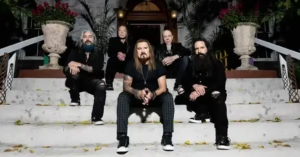Opeth: From Brutal Beginnings to Progressive Mastery
Opeth. Formation and Early Vision
Opeth was formed in Stockholm, Sweden, in 1990 by David Isberg, but after early lineup changes, Mikael Åkerfeldt (vocals, guitar) emerged as the band’s leader, composer, and defining creative force.
Core traits:
- Rooted in death metal, but always exploring acoustic, jazz, folk, and prog rock textures
- Known for sudden dynamic shifts: from brutal growls and blast beats to fragile acoustic passages and clean vocals
- A band that challenges genre boundaries and reshapes expectations
Opeth. Early Albums: Death Metal with Depth (1995–1998)
✦ Orchid (1995)
A startling debut with long, winding compositions that fused blackened death metal with acoustic interludes.
- Complex structures, Tolkien-esque lyrics, and moody atmosphere
- Tracks like “In Mist She Was Standing” set the tone for future epics
✦ Morningrise (1996)
- A step deeper into melancholy and melody, with five extended tracks
- “Black Rose Immortal” remains their longest song (20+ mins)
- Cemented their cult status among underground metal fans
✦ My Arms, Your Hearse (1998)
- A concept album about a ghost witnessing his own funeral and the aftermath
- The shift to more aggressive, compact songwriting
- Marked the arrival of drummer Martin Lopez and bassist Martín Méndez
Opeth. Creative Peak: The Metal-Prog Duality (1999–2005)
✦ Still Life (1999)
A fan favorite, combining narrative storytelling with dynamic range.
- “The Moor,” “Face of Melinda,” “Serenity Painted Death”
- The band’s first true blend of growls and clean singing in emotional arcs
✦ Blackwater Park (2001)
Produced by Steven Wilson (Porcupine Tree), who also contributed keys and backing vocals.
Highlights:
- “The Leper Affinity,” “Bleak,” “Harvest,” and the title track
- Considered their masterpiece, blending death metal ferocity with progressive elegance
- Breakthrough album that brought them global recognition
✦ Deliverance (2002) & Damnation (2003)
Twin albums recorded simultaneously:
- Deliverance – Their heaviest, with massive riffs and punishing grooves
- Damnation – Their softest, entirely clean vocals and mellotron-heavy, 70s-style prog
This duality displayed the two halves of Opeth’s soul — metal and melody, aggression and reflection.
✦ Ghost Reveries (2005)
- Their last album with Martin Lopez and first with keyboardist Per Wiberg
- “Ghost of Perdition,” “The Baying of the Hounds,” “Isolation Years”
- A balance between extreme metal and King Crimson-inspired prog
Opeth. Transformation: Leaving Growls Behind (2008–2019)
✦ Watershed (2008)
- Their last album with growled vocals (for over a decade)
- “Coil,” “Burden,” “Heir Apparent” — a surreal farewell to death metal
- Seen as a pivot point in their evolution
✦ Heritage (2011)
A bold shift to 1970s progressive rock, completely dropping harsh vocals
- Jazzy time signatures, Hammond organs, and flute
- “The Devil’s Orchard,” “I Feel the Dark,” “Folklore”
Divisive among fans, but critically respected for artistic courage.
✦ Pale Communion (2014) & Sorceress (2016)
- Continued their prog-rock journey, blending Yes, Camel, and King Crimson influences
- Mellotron, vintage synths, and lyrical themes of loss, ego, and ritual
“Sorceress” was darker, groovier, and doom-tinged — showing that the band could still sound heavy without distortion or growls.
✦ In Cauda Venenum (2019)
Released in both Swedish and English versions, their most ambitious work yet.
Standouts:
- “Dignity,” “Heart in Hand,” “All Things Will Pass”
- A cinematic, emotionally rich album that reflects on aging, society, and mortality
Opeth. Musicianship and Identity
Mikael Åkerfeldt is one of metal’s most respected figures:
- Capable of both guttural growls and angelic clean singing
- Passionate about ’70s prog, vinyl collecting, obscure jazz, and Scandinavian folk
Martin Axenrot (drummer from 2006–2021) brought technical flair, while Fredrik Åkesson (guitarist since 2007) helped shape the band’s newer, riff-heavy sound.
Opeth is known for:
- Time signature wizardry
- Genre fluidity
- Live shows that shift from brutal to serene
- Lyrics about death, spirituality, metaphysics, and nature
Legacy and Influence
Opeth is celebrated for:
- Redefining what metal can be
- Inspiring a wave of progressive death metal bands like Ne Obliviscaris, Persefone, and Obscura
- Bridging the gap between fans of Dream Theater and Death
Accolades:
- Widely regarded as the most important band of the 21st century
- Regularly top year-end album lists
- Influential across death metal, prog rock, and art music circles
Interesting Facts
- The name Opeth comes from a fictional city called Opet in the novel Sunbird by Wilbur Smith
- Mikael Åkerfeldt almost joined Bloodbath full-time, but focused on Opeth
- Steven Wilson called Still Life and Blackwater Park “the most important albums in modern metal”
- The band played special all-acoustic sets in support of Damnation
- In Cauda Venenum means “poison in the tail” — a metaphor for sweetness with a sting





